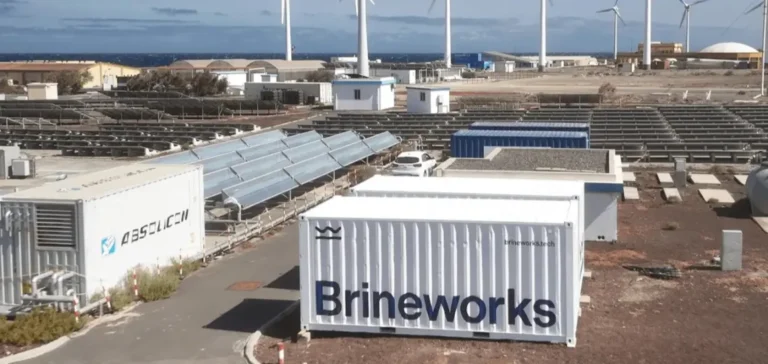Brineworks, based in Amsterdam, raised €6.8mn ($7.27mn) to accelerate commercialisation of its direct air capture of CO₂ (Direct Air Capture, DAC). The round was led by SeaX Ventures, with several specialist investors. Pale Blue Dot, First Momentum, AiiM Partners, Energie360° and Katapult participated. The company also obtained a €1.8mn ($1.93mn) grant via the European Innovation Council (EIC) Accelerator.
A DAC electrolyser designed for renewable intermittency
The core of the process is a patented electrolyser that captures CO₂ while producing hydrogen (H₂). The unit operates in load-following mode, stopping and restarting according to wind and solar availability. This capability addresses a recurring constraint of conventional systems fed variably. The company states that performance does not degrade under intermittent operation.
The dual CO₂ and H₂ streams are intended for maritime e-methanol and sustainable aviation fuel (SAF). Aviation accounts for around 2.5% of global CO₂ emissions. Shipping exceeds 3%. Brineworks targets capture costs below $100 per tonne, a threshold regarded by the market as pivotal for industrialisation.
Scale-up timeline and use cases
Founded in late 2023, the company reports moving from concept to prototype validation. The funds will be used to build a first pilot, with commercial availability targeted by end-2026. The system is modular to integrate with e-fuels sites. The stated trajectory relies on access to low-cost renewable electricity.
Compatibility with a grid with a high renewable share enables optimisation of low-price hours. Operational flexibility is presented as a lever to cut synthetic fuel costs. Producers could couple DAC to local synthesis units to secure supply. This approach aims for shorter supply chains and on-site production.
Use of proceeds and industrial validation
The financing will cover research and development as well as pilot deployment. Investors cite potential cost reductions and the ambition to scale rapidly. The EIC Accelerator grant targets technology maturation and system integration. “With many long nights of work, we’ve proven a clear path to capturing CO₂ directly from air at below $100 per ton,” said Dr Joseph Perryman, co-founder and Chief Technology Officer of Brineworks.






















